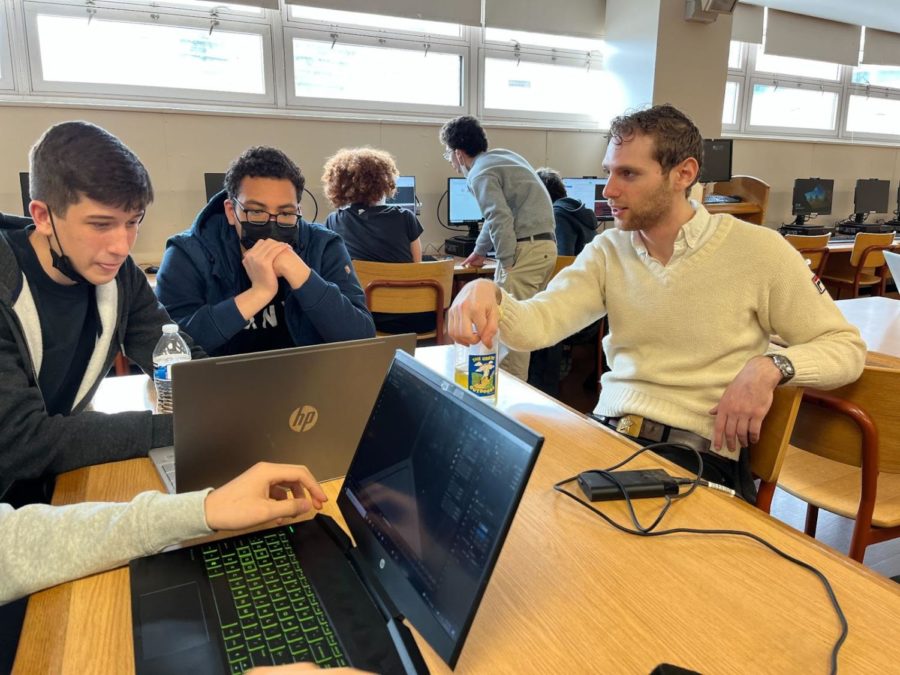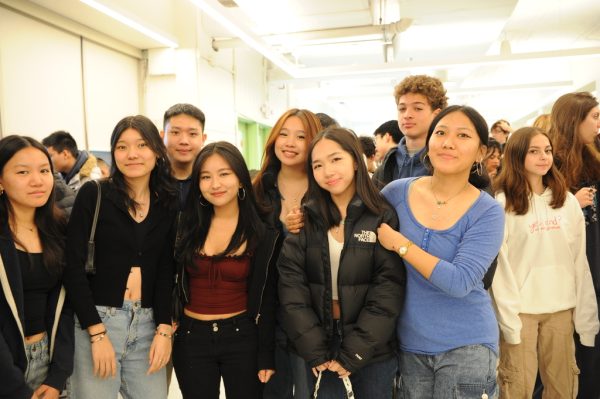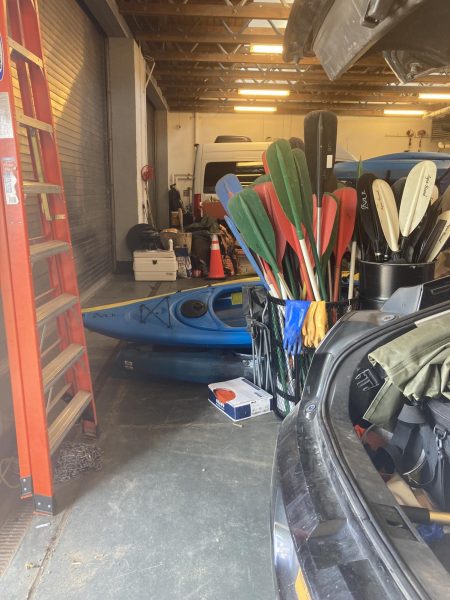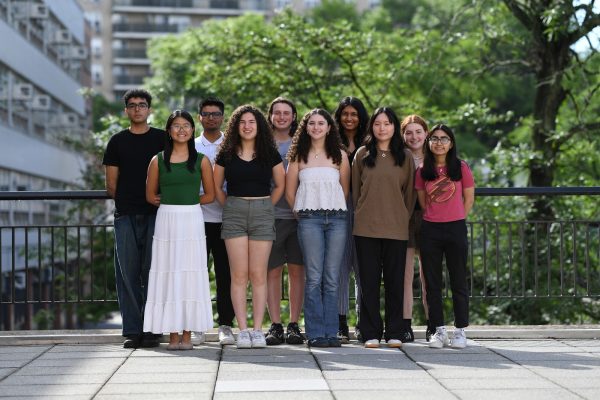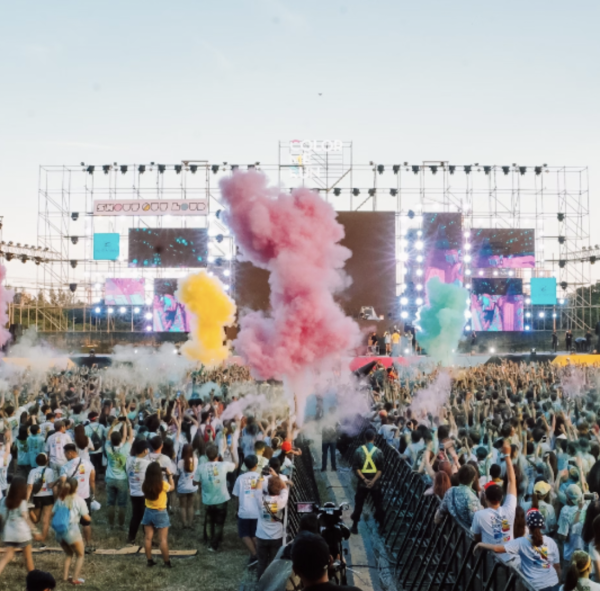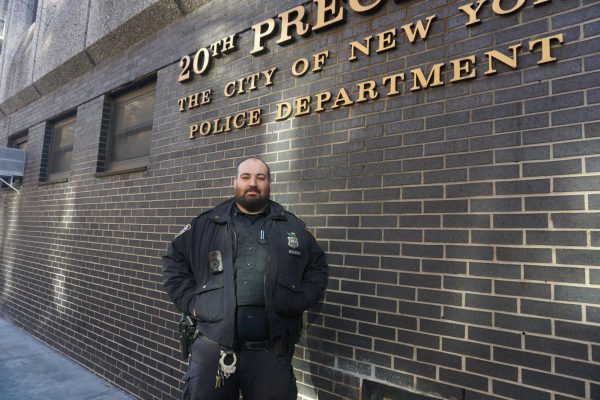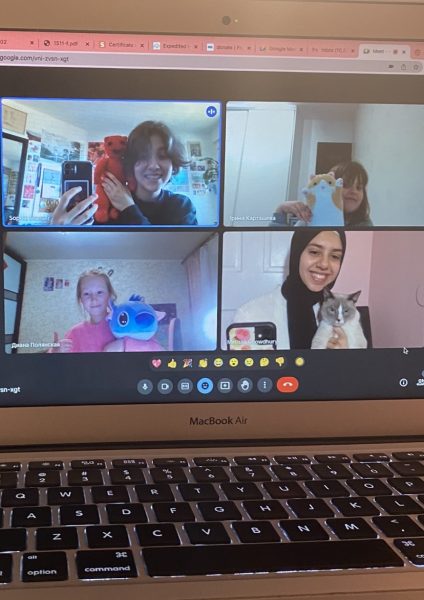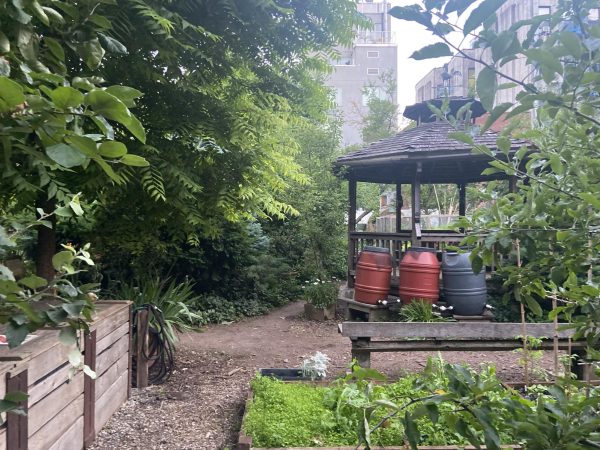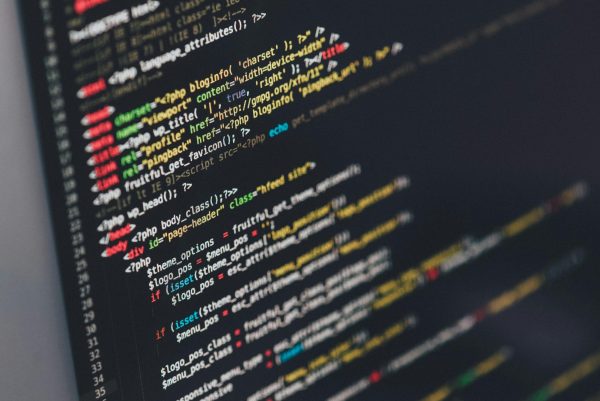AtomHacks: A Look into Bronx Science’s Hackathon
AtomHacks is a twelve-hour hackathon, where students work to design and program their best websites, apps, games, and more!
A team at AtomHacks VIII gets help from mentor and Fullstack Web Development Workshop host Harry Shapiro ’14.
At the TechCrunch Hackathon in 2010, it took just twenty-four hours for two programmers to make a group-messaging app that was previously slated to take eighteen months to build. Coming up with the idea just days before the hackathon, Jared Hecht and Steve Martocci coded a functional messaging application called GroupMe that would eventually become a multimillion-dollar company. Despite their app’s later successes, Hecht and Martocci did not even take home a prize at the hackathon, meaning there were other projects produced from the hackathon that surpassed one that would later come to earn millions of dollars.
A hackathon, deriving from the words “hack” and “marathon,” is a coding event where programmers work alone or in teams to design and build a functional program within the designated time frame. During hackathons, the best programmers compete to create the most attractive applications to win prizes and sometimes, win funding.
While hackathons do not necessarily require the physical strength of a marathon, competitors often stay up in order to maximize the amount of time they have to code, especially during twenty-four or forty-eight hour events.
Since 2015, Bronx Science’s AtomHacks has held a school-wide hackathon every year (with the exception of 2020). Organized by the AtomHacks Committee, the hackathon is filled with prizes, workshops, mentors, and the perfect balance of collaboration and competition.
The AtomHacks Committee
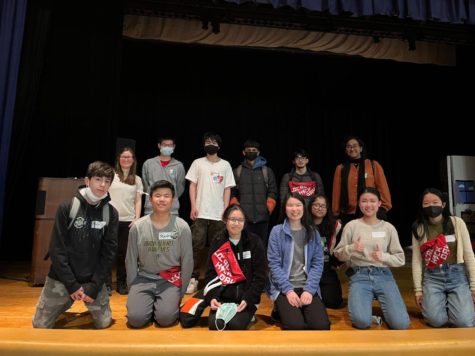
The AtomHacks Committee is made up of fifteen students divided into three departments: Programming, Design, and Outreach. Under the guidance of co-presidents Kathryn Le ’22 and Skye Lam ’22 as well as advisor and Physical Science teacher Ms. Marieke Thomas, the three departments work cohesively to produce an all-day hack event.
The role of each department corresponds with exactly what you might think. Design is responsible for producing promotional material, like social media posts, videos, and posters, and “swag,” like t-shirts and stickers for participants. Outreach is responsible for promoting the hackathon to students and sponsors. Programming is responsible for coding the AtomHacks website and serving as mentors during the hackathon itself.
Although they each have their own designated roles, the duties of each department often overlap. To advertise, for example, Outreach relies on the graphics produced by Design and the website produced by Programming. As co-presidents of the committee, Le & Lam’s main jobs are to keep these departments accountable in their work and help ease the communication between the branches of the committee.
From October to March, the AtomHacks Committee works tirelessly both remotely and in-person to create a themed, twelve-hour hackathon. “I feel like the components of a hackathon are pretty simple and easy to envision getting done quickly, but it actually takes a lot of time for us to make a hackathon,” said Le.
Since these events require the help of many people, communication is key. As a committee, AtomHacks reaches out to many people each week to coordinate logistics like building permits, sponsorship deals, workshops, food services, and more. With the help of the Alumni Foundation, the school administration, and sponsors, the committee is able to focus on what matters most: a fun, engaging experience for those involved in the hackathon.
“We modeled AtomHacks after our school motto, where students are given the tools needed to inquire, discover, and create innovative projects aimed at solving societal issues,” said Lam.
The AtomHacks VIII
This year, the hackathon was held on Saturday, March 26th, 2022 from 8 a.m. to 8 p.m. It was the first in-person hackathon at Bronx Science since the start of the COVID-19 pandemic. This year, the hackathon had the most student participation since the inception of AtomHacks with 124 attendees. Although the process of creating the in-person event varied greatly from that of creating a virtual event, the many hours that the AtomHacks committee had dedicated to making the hackathon possible were put on clear display.
Seeing the relevance in our lives today, the AtomHacks committee set this year’s theme as “healthcare.” With this theme in mind, participants were tasked with coding anything remotely related to healthcare within the eight hour time frame. Popular projects included websites, apps, and games that promoted or aided in healthcare initiatives. At AtomHacks VIII, five prizes were awarded: First Place, Second Place, Third Place, Best Hack, and Best Beginner Hack.
Project Felix, created by Taj Jethwani-Keyser ’23, Demetrios Gavalas ’23, and Taokir Pitam ’23, took home the First Place prize. With their goal of advancing technology within the healthcare industry, they programmed a website and a video-chatting platform where doctors could easily and efficiently communicate with their patients.
Kernel Initiative, produced by Samuel Buena ’23, Will Kalish ’23, Johann Paul ’23, and Serena Yung ’23, won the Second Place prize. In the interest of addressing inequality issues in healthcare, they created an app that uses Google Maps to provide a visualization of “disparities in New York City’s healthcare system.”
Praxis H, created by Azhar Ahmed ’22, Darren Dong ’22, Jerry He ’22, and Evan Lin ’22, secured the Third Place prize. Using an app development software known as Android Studio, they coded a fitness tracker app that allows users to monitor their health through diet planning, health reminders, and calorie tracking capabilities.
Dr. Atoms, created by Theodoros Konstantinidis ’25, took home the Best Hack prize. Konstantinidis coded a game where the user plays as Dr. Atoms, a scientist in a laboratory, to cure a deadly sickness.
QuickMed, created by William Kim ’23, Aaron Tang ’23, Benjamin Chong ’23, and Jeffrey Li ’23, won the Best Beginner’s Hack prize. Focusing primarily on accessibility, they designed a website that allows users to easily find nearby medical resources, like medical centers, COVID-19 testing stations, and mental health consultations.
Running in parallel with the hackathon, an assortment of hosts held twelve live workshops throughout the day. Hosts ranged from teachers and alumni to even current students. The workshops catered to participants of all levels. Some workshops dove into introductory coding topics, like Alex Gonzalez ’24’s Intro to Python and Ms. Thomas’s Intro to HTML and CSS classes. Other workshops discussed more advanced topics, like Ramansh Sharma ’18’s Machine Learning Research and Michael Batavia ’21’s Game Development demonstrations. Through these hour-long seminars, participants were able to learn about new computer science topics and potentially employ their newfound knowledge to their project.
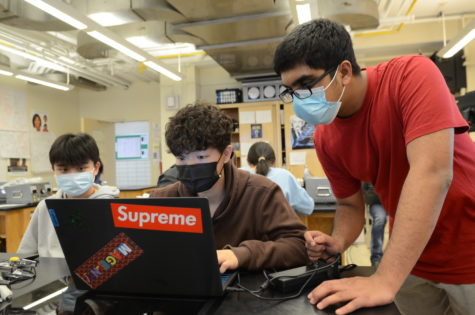
Throughout the day, participants were also welcome to consult with experienced mentors to receive help for their projects or gain a better understanding of working in a computer science field. “For me, it was reassuring that many of the successful alumni didn’t start learning computer science until college. The fact that the students who participated at the hackathon already have a headstart is so cool,” said Alyssa Hsu ’23.
The Future of AtomHacks
With over 100 students present at the last hackathon, the future of AtomHacks looks promising. The AtomHacks Committee has plans to continue holding events for years to come. Although Le and Lam will be graduating at the end of the year, they have their own personal hopes for what the hackathon will look like in the future.
Lam hopes to see an event where students can learn more about a future in computer science. He said, “I would like to see a career panel where students can learn more about the distinct journey that professionals in the computer science field took to get to their current positions. That way, participants can begin to map up potential career pathways for the future that interests them the most.”
Le, on the other hand, has ideas for social good. “I wish we can make hackathons for other schools or let other kids join our hackathon. I know the feasibility is really hard, but as a place with a lot of opportunities, being able to expand to other schools would be cool to see,” said Le.
As for Ms. Thomas’s hackathon dreams, if money were no object, she said, “I think it would be cool to have a super-famous guest speaker, like Bill Gates or Tim Cook. Also, just for the day, I would fill the school with comfy furniture like squishy couches and armchairs.”
AtomHacks is an exciting opportunity for students that have even the slightest interest in computer science. With enthusiasm, initiative, and creativity, teenagers can create apps, games, and websites of their own that bring about positive impact or even just provide fun and entertainment.
For more information on future AtomHacks initiatives, check out their website and their Instagram page!
“We modeled AtomHacks after our school motto, where students are given the tools needed to inquire, discover, and create innovative projects aimed at solving societal issues,” said Skye Lam ’22.
Jillian Chong is an Editor-in-Chief for ‘The Science Survey.’ As a journalist, she loves that she has the ability to voice her opinions and inform...
Cadence Chen is an Editor-in-Chief for ‘The Science Survey.’ She enjoys journalistic writing for its artistic concision and sharp insights. Cadence...
Alvina Rahman is a Chief Graphic Designer and Managing Editor for 'The Observatory' yearbook and a Staff Reporter' for 'The Science Survey' newspaper....

